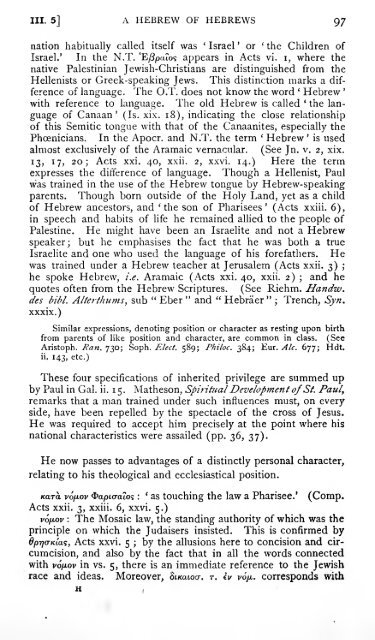Philippians and Philemon - MR Vincent - 1906.pdf
Philippians and Philemon - MR Vincent - 1906.pdf
Philippians and Philemon - MR Vincent - 1906.pdf
Create successful ePaper yourself
Turn your PDF publications into a flip-book with our unique Google optimized e-Paper software.
III. 5] A HEBREW OF HEBREWS 97<br />
nation habitually called itself was ' Israel ' or ' the Children of<br />
Israel.' In the N.T.'appears in Acts vi. i, where the<br />
native Palestinian Jewish-Christians are distinguished from the<br />
Hellenists or Greek-speaking Jews. This distinction marks a difference<br />
of language. The O.T. does not know the word ' Hebrew<br />
with reference to language. The old Hebrew is called ' the language<br />
of Canaan' (Is. xix. 18), indicating the close relationship<br />
of this Semitic tongue with that of the Canaanites, especially the<br />
Phoenicians. In the Apocr. <strong>and</strong> N.T. the term ' Hebrew ' is used<br />
almost exclusively of the Aramaic vernacular. (See Jn. v. 2, xix.<br />
13, 17, 20; Acts xxi. 40, xxii. 2, xxvi. 14.) Here the term<br />
expresses the difference of language. Though a Hellenist, Paul<br />
was trained in the use of the Hebrew tongue by Hebrew-speaking<br />
parents. Though born outside of the Holy L<strong>and</strong>, yet as a child<br />
of Hebrew ancestors, <strong>and</strong> 'the son of Pharisees' (Acts xxiii. 6),<br />
in speech <strong>and</strong> habits of life he remained aUied to the people of<br />
Palestine. He might have been an Israelite <strong>and</strong> not a Hebrew<br />
speaker; but he emphasises the fact that he<br />
Israelite <strong>and</strong> one who used the language of his<br />
was both a<br />
forefathers.<br />
true<br />
He<br />
was trained under a Hebrew teacher at Jerusalem (Acts xxii. 3) ;<br />
he spoke Hebrew, i.e. Aramaic (Acts xxi. 40, xxii. 2) ; <strong>and</strong> he<br />
quotes often from the Hebrew Scriptures. (See Riehm. H<strong>and</strong>w.<br />
des bibl. Alterthutns, sub " Eber " <strong>and</strong> " Hebraer " ; Trench, Syn.<br />
xxxix.)<br />
Similar expressions, denoting position or character as resting upon birth<br />
from parents of like position <strong>and</strong> character, are common in class. (See<br />
Aristoph. J^an. 730; Soph. Elect. 589; Philoc. 384; Eur. Ale. 677; Hdt.<br />
ii. 143, etc.)<br />
These four specifications of inherited privilege are summed up<br />
by Paul in Gal. ii. 15. Matheson, Spiritual Development 0/ St. Paul,<br />
remarks that a man trained under such influences must, on every<br />
side, have been repelled by the spectacle of the cross of Jesus.<br />
He was required to accept him precisely at the point where his<br />
national characteristics were assailed (pp. 36, 37).<br />
He now passes to advantages of a distinctly personal character,<br />
relating to his theological <strong>and</strong> ecclesiastical position.<br />
:<br />
' as touching the law a Pharisee.' (Comp.<br />
Acts xxii. 3, xxiii. 6, xxvi. 5.)<br />
: The Mosaic law, the st<strong>and</strong>ing authority of which was the<br />
principle on which the Judaisers insisted. This is confirmed by<br />
,Acts xxvi. 5 ; by the allusions here to concision <strong>and</strong> circumcision,<br />
<strong>and</strong> also by the fact that in all the words connected<br />
with in vs. 5, there is an immediate reference to the Jewish<br />
race <strong>and</strong> ideas. Moreover,..iv . corresponds with<br />
'





